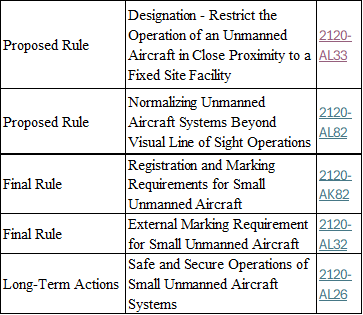Fall 2024 Unified Agenda – FAA and UAS
FAA and UAS
Last week the Biden Administration published their Fall 2024 Unified Agenda. The Department of Transportation portion of that Agenda lists 35 rulemakings being considered by the Federal Aviation Administration. Four of those rulemakings address the operations of uncrewed aircraft systems. One additional rulemaking is listed under the FAA listings on the DOT long term agenda. The Pipeline and Hazardous Materials Safety Administration (PHMSA) also has one UAS related rulemaking listed in the Unified Agenda.
Each individual rulemaking listed in the Unified Agenda has a link to a file about that proposed rule. That file includes such information as:
An abstract describing rulemaking,
CFR and USC citations for the proposed regulations,
Legal deadlines (which are seldom if ever enforced),
The aspirational timeline for the next step in the regulatory process, and
Point of contact information at the agency.
FAA UAS Rulemakings
The table below shows the five rulemakings listed for the Federal Aviation Administration pertaining to uncrewed aircraft systems.
All of these rulemakings were listed in the Spring 2024 Unified Agenda, but two have moved from the Long Term Agenda to the ‘more active’ main page:
Registration and Marking Requirements for Small Unmanned Aircraft - 2120-AK82, and
External Marking Requirement for Small Unmanned Aircraft - 2120-AL32
PHMSA UAS Rulemaking
PHMSA has added a UAS related rulemaking to their portion of the Unified Agenda:
Hazardous Materials: Modernizing Regulations to Facilitate Transportation of Hazmat Using Autonomous Systems - 2137-AF68
According to the new entry for this rulemaking:
“In this rulemaking, PHMSA would amend the Hazardous Materials Regulations (HMR) to address the role of autonomous transportation systems (e.g., drones, etc.) in the transportation of hazardous materials. The rulemaking will consider necessary clarifications to the HMR regarding handling, transportation, and hazard communication unique to the movement of hazardous materials by autonomous transport systems. PHMSA would coordinate closely with its modal partners within the Federal Aviation Administration, Federal Motor Carrier Safety Administration, Federal Railroad Administration, and U.S. Coast Guard to ensure a comprehensive approach that allows for the seamless movement of goods across multiple modes of transport while allowing for the specific needs of each mode to be safely addressed.”
Commentary
I do not see anything in any of these rulemakings that would specifically run afoul of the anti-regulatory aspirations of the incoming Trump Administration. I would expect that there would be some minor differences in some of the details from what we would have seen if Harris had been elected. The big difference will be the timing; I would not expect a big push to quickly move any of these regulations across the finish line even though various industrial partners (especially the chemical process industry) will be pushing for the facility registration rulemaking. Still, the people surrounding Trump have a natural mistrust of government regulations, so quick movement is not to be expected.
